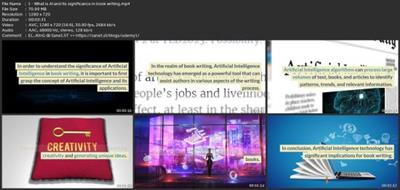How To Write Ai Books
Published 9/2023
MP4 | Video: h264, 1280x720 | Audio: AAC, 44.1 KHz
Language: English | Size: 860.80 MB | Duration: 0h 43m
AI Book Writing Guide
What you'll learn
Introduction to AI Technology
Creating Engaging AI Characters
Structuring and Formatting AI Books for Amazon Kindle
Marketing Strategies for AI Books
and more.
Requirements
No Requirements
Description
This course is designed to help book writers learn how to write AI books specifically for Amazon Kindle Direct Publishing. It will cover the basics of AI technology, how to create engaging AI characters, and how to structure and market AI books. By the end of this course, learners will have the necessary knowledge and skills to write and publish AI books on Amazon Kindle.Course objectivesUnderstand the basics of AI technology and its applications in book writingLearn how to create compelling AI characters that resonate with readersMaster the techniques for structuring and formatting AI books for Amazon KindleExplore effective marketing strategies for promoting AI booksGain practical insights and tips from successful AI book authorsIntroduction to Artificial Intelligence TechnologyIn order to understand the significance of Artificial Intelligence in book writing, it is important to first grasp the concept of Artificial Intelligence and its applications. Artificial Intelligence refers to the simulation of human intelligence in machines that are programmed to think and learn like humans. It involves the development of computer systems capable of performing tasks that would typically require human intelligence, such as speech recognition, decision-making, problem-solving, and natural language processing.The use of Artificial Intelligence in various fields has revolutionized the way we live and work. In the realm of book writing, Artificial Intelligence technology has emerged as a powerful tool that can assist authors in various aspects of the writing process. From generating ideas and providing content suggestions to editing and proofreading, Artificial Intelligence has the potential to enhance the efficiency and quality of book production.One of the key advantages of using Artificial Intelligence in book writing is its ability to analyze vast amounts of data and extract meaningful insights. Artificial Intelligence algorithms can process large volumes of text, books, and articles to identify patterns, trends, and relevant information. This can be extremely valuable for authors as it helps them in conducting comprehensive research and gathering relevant data to support their writing.Artificial Intelligence can also assist authors in generating ideas and brainstorming. By analyzing existing books and their themes, Artificial Intelligence algorithms can provide authors with suggestions for plotlines, characters, and settings. This not only saves time but also helps in sparking creativity and generating unique ideas.Another significant application of Artificial Intelligence in book writing is in the editing and proofreading process. Artificial Intelligence-powered tools can analyze the grammar, spelling, punctuation, and overall coherence of the text, providing authors with valuable feedback and suggestions for improvement. This can greatly enhance the quality of the final manuscript and reduce the need for extensive manual editing.Furthermore, Artificial Intelligence technology can also be utilized in the marketing and promotion of books. By analyzing reader preferences and behavior, Artificial Intelligence algorithms can help authors identify their target audience and develop effective marketing strategies. This can result in better book sales and a wider reach for the author.It is important to note that while Artificial Intelligence can be a valuable tool for authors, it is not meant to replace human creativity or the art of storytelling. Artificial Intelligence should be seen as a complementary tool that can assist authors in various aspects of the writing process, ultimately enhancing their productivity and the quality of their work.In conclusion, Artificial Intelligence technology has significant implications for book writing. From idea generation to editing and marketing, Artificial Intelligence can assist authors in various stages of the writing process, providing valuable insights and enhancing the overall quality of the final product. As Artificial Intelligence continues to evolve, it is important for authors to embrace this technology and leverage its capabilities to their advantage.
Overview
Section 1: Introduction to AI Technology
Lecture 1 What is AI and its significance in book writing
Lecture 2 AI applications in the publishing industry
Section 2: Creating Engaging AI Characters
Lecture 3 Understanding the psychology of AI characters
Lecture 4 Developing unique and relatable AI personalities
Section 3: Structuring and Formatting AI Books for Amazon Kindle
Lecture 5 Organizing AI book content
Lecture 6 Choosing the right AI book format and layout
Section 4: Marketing Strategies for AI Books
Lecture 7 Identifying target readers for AI books
Lecture 8 Promoting AI books through social media and online platforms
Section 5: Insights from Successful AI Book Authors
Lecture 9 Lessons learned from successful AI book authors
Lecture 10 Tips for overcoming challenges in writing AI books
Beginners
Screenshots
Download link
rapidgator.net:
uploadgig.com:Kod:https://rapidgator.net/file/4a9c282afe34f45ca93ead6053cd2855/hncei.How.To.Write.Ai.Books.rar.html
nitroflare.com:Kod:https://uploadgig.com/file/download/aa2c915cf81f57d3/hncei.How.To.Write.Ai.Books.rar
Kod:https://nitroflare.com/view/D953416B1FBCE2A/hncei.How.To.Write.Ai.Books.rar
1 sonuçtan 1 ile 1 arası
Konu: How To Write Ai Books
-
20.09.2023 #1Üye



- Üyelik tarihi
- 20.08.2016
- Mesajlar
- 144.971
- Konular
- 0
- Bölümü
- Bilgisayar
- Cinsiyet
- Kadın
- Tecrübe Puanı
- 153
How To Write Ai Books
Konu Bilgileri
Users Browsing this Thread
Şu an 1 kullanıcı var. (0 üye ve 1 konuk)



 LinkBack URL
LinkBack URL About LinkBacks
About LinkBacks






 Alıntı
Alıntı
Konuyu Favori Sayfanıza Ekleyin